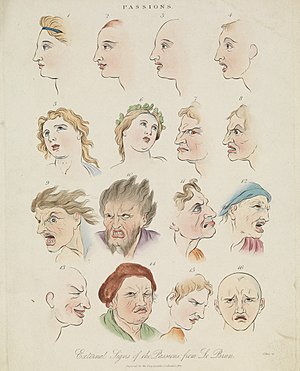 Global Information
Global InformationEmotion information

| Part of a series on |
| Emotions |
|---|
  |
|
Emotions are physical and mental states brought on by neurophysiological changes, variously associated with thoughts, feelings, behavioral responses, and a degree of pleasure or displeasure.[1][2][3][4] There is no scientific consensus on a definition.[5][6] Emotions are often intertwined with mood, temperament, personality, disposition, or creativity.[7]
Research on emotion has increased over the past two decades, with many fields contributing, including psychology, medicine, history, sociology of emotions, and computer science. The numerous attempts to explain the origin, function, and other aspects of emotions have fostered intense research on this topic. Theorizing about the evolutionary origin and possible purpose of emotion dates back to Charles Darwin. Current areas of research include the neuroscience of emotion, using tools like PET and fMRI scans to study the affective picture processes in the brain.[8]
From a mechanistic perspective, emotions can be defined as "a positive or negative experience that is associated with a particular pattern of physiological activity."[4] Emotions are complex, involving multiple different components, such as subjective experience, cognitive processes, expressive behavior, psychophysiological changes, and instrumental behavior.[9][10] At one time, academics attempted to identify the emotion with one of the components: William James with a subjective experience, behaviorists with instrumental behavior, psychophysiologists with physiological changes, and so on. More recently, emotion has been said to consist of all the components. The different components of emotion are categorized somewhat differently depending on the academic discipline. In psychology and philosophy, emotion typically includes a subjective, conscious experience characterized primarily by psychophysiological expressions, biological reactions, and mental states. A similar multi-componential description of emotion is found in sociology. For example, Peggy Thoits described emotions as involving physiological components, cultural or emotional labels (anger, surprise, etc.), expressive body actions, and the appraisal of situations and contexts.[11] Cognitive processes, like reasoning and decision-making, are often regarded as separate from emotional processes, making a division between "thinking" and "feeling". However, not all theories of emotion regard this separation as valid.[12]
Nowadays, most research into emotions in the clinical and well-being context focuses on emotion dynamics in daily life, predominantly the intensity of specific emotions and their variability, instability, inertia, and differentiation, as well as whether and how emotions augment or blunt each other over time and differences in these dynamics between people and along the lifespan.[13][14]
- ^ Panksepp, Jaak (2005). Affective neuroscience: the foundations of human and animal emotions ([Reprint] ed.). Oxford [u.a.]: Oxford Univ. Press. p. 9. ISBN 978-0195096736.
Our emotional feelings reflect our ability to subjectively experience certain states of the nervous system. Although conscious feeling states are universally accepted as major distinguishing characteristics of human emotions, in animal research the issue of whether other organisms feel emotions is little more than a conceptual embarrassment
- ^ Damasio AR (May 1998). "Emotion in the perspective of an integrated nervous system". Brain Research. Brain Research Reviews. 26 (2–3): 83–86. doi:10.1016/s0165-0173(97)00064-7. PMID 9651488. S2CID 8504450.
- ^ Ekman, Paul; Davidson, Richard J. (1994). The Nature of emotion: fundamental questions. New York: Oxford University Press. pp. 291–293. ISBN 978-0195089448.
Emotional processing, but not emotions, can occur unconsciously.
- ^ a b Schacter, Daniel L.; Gilbert, Daniel T.; Wegner, Daniel M. (2011). Psychology (2nd ed.). New York: Worth Publishers. p. 310. ISBN 978-1429237192.
- ^ Cabanac, Michel (2002). "What is emotion?". Behavioural Processes. 60 (2): 69–83. doi:10.1016/S0376-6357(02)00078-5. PMID 12426062. S2CID 24365776.
There is no consensus in the literature on a definition of emotion. The term is taken for granted in itself and, most often, emotion is defined with reference to a list: anger, disgust, fear, joy, sadness, and surprise. [...] I propose here that emotion is any mental experience with high intensity and high hedonic content (pleasure/displeasure).
- ^ Lisa Feldman Barrett; Michael Lewis; Jeannette M. Haviland-Jones, eds. (2016). Handbook of emotions (Fourth ed.). New York. ISBN 978-1462525348. OCLC 950202673.
{{cite book}}: CS1 maint: location missing publisher (link) - ^ Averill, James R. (February 1999). "Individual Differences in Emotional Creativity: Structure and Correlates". Journal of Personality. 67 (2): 331–371. doi:10.1111/1467-6494.00058. ISSN 0022-3506. PMID 10202807.
- ^ Cacioppo, John T.; Gardner, Wendi L. (1999). "Emotion". Annual Review of Psychology. 50: 191–214. doi:10.1146/annurev.psych.50.1.191. PMID 10074678.
- ^ Cabral, J. Centurion; de Almeida, Rosa Maria Martins (2022). "From social status to emotions: Asymmetric contests predict emotional responses to victory and defeat". Emotion. 22 (4): 769–779. doi:10.1037/emo0000839. ISSN 1931-1516. PMID 32628033. S2CID 220371464.
- ^ Cite error: The named reference
:1was invoked but never defined (see the help page). - ^ Thoits PA (1989). "The sociology of emotions". Annual Review of Sociology. 15: 317–342. doi:10.1146/annurev.soc.15.1.317.
- ^ Barrett LF, Mesquita B, Ochsner KN, Gross JJ (January 2007). "The experience of emotion". Annual Review of Psychology. 58 (1): 373–403. doi:10.1146/annurev.psych.58.110405.085709. PMC 1934613. PMID 17002554.
- ^ Reitsema, A.M. (2021). "Emotion dynamics in children and adolescents: A meta-analytic and descriptive review". Emotion. 22 (2): 374–396. doi:10.1037/emo0000970. PMID 34843305. S2CID 244748515.
- ^ Charles, Susan T.; Carstensen, Laura L. (1 January 2010). "Social and Emotional Aging". Annual Review of Psychology. 61 (1): 383–409. doi:10.1146/annurev.psych.093008.100448. ISSN 0066-4308. PMC 3950961. PMID 19575618.